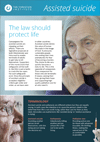Patients in a persistent vegetative state (PVS) may be capable of some understanding and some communication, according to a groundbreaking new study.
Pro-life campaigners will welcome the news as an indication that treatment should not be withdrawn from patients in a PVS.
But pro-euthanasia activists have hailed the discovery as an opportunity for PVS patients to be able to choose to end their lives.
The findings, published in the New England Journal of Medicine, were based on a study of 54 patients suffering from disorders of consciousness, 23 of who were in a PVS.
Four of the PVS patients were found to be aware, and one of the patients was given further tests in which he was able to answer simple ‘yes’ and ‘no’ questions for the researchers.
The research will raise many ethical questions for medical professionals, including how they would respond to PVS patients who could, theoretically, appear to express a wish to die.
Dr Jacob Appel, an expert in medical ethics at Mount Sinai Hospital in New York, said: “This will indeed be a clear-cut case where a patient can express a desire to end his or her life, but has no physical means of doing so.
“I see no reason why, if we are truly convinced such patients are communicating, society should not honour their wishes.”
However, critics have warned that patients in a PVS should not be called on to make such decisions.
Dr Peter Saunders, from the campaign group Care Not Killing, said that it was unlikely that PVS patients would be considered to have sufficient mental capacity to make life and death decisions.
His concerns were echoed by the British Medical Association, which indicated that many medics would not consider the results of brain scan experiments as evidence of mental capacity.
And Professor Geraint Rees, Director of the Institute of Cognitive Neuroscience at University College London, said: “At the moment it is premature to conclude that the individual able to answer five out of six yes/no questions is fully conscious like you or I.”
The research was funded by the Medical Research Council and the University of Liege.
Last year it was revealed that a Belgian man who was misdiagnosed as being in a PVS for 23 years was fully conscious the whole time.
Rom Houben was left completely paralysed after a car crash in 1983 and doctors believed that he was in a PVS.
The fact that Mr Houben was conscious was only discovered three years ago after he was examined using state of the art equipment.
And twenty years ago an 86-year-old woman from New York regained consciousness after being in a coma for one year.
Days earlier, a judge had granted her family’s request for the removal of her feeding tube.


